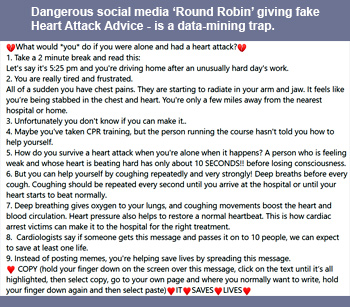 |
|
|
|
Could something called ‘cough CPR’ save your life? People on Facebook are circulating a claim that if you suffer a heart attack when alone, something called ‘cough CPR’ will save your life. But as with too many things on social media; the statements in 'round robins' being copied and regurgitated by people believing everything they read in social media as being true!
On the British Heart Foundation's website, this specific false 'ruse' is addressed by Senior Cardiac Nurse Christopher Allen: "The absolute priority when you think you or someone else is having a heart attack is to call 999. This way, paramedics can assess and aid you, and you’ll get to hospital as fast as possible. There is no medical evidence to support ‘cough CPR’, which suggests you can help yourself by coughing vigorously if you think you’re having a heart attack and are alone. Please avoid spreading this myth any further A heart attack is when the blood supply to your heart muscle is interrupted; this is most commonly due to a blood clot. A heart attack can lead to a cardiac arrest, when your heart stops pumping blood around your body. You would become unconscious, and without immediate CPR (chest compressions and rescue breaths), you would die. If you are still conscious (and you would have to be to do ‘cough CPR’), then you are not in cardiac arrest and therefore CPR is not needed, but urgent medical help is vital. The ‘cough CPR’ myth has been circulating the internet for a while now, especially on social media sites such as Facebook. If you come across it, please avoid spreading it any further and consider letting the person who posted it know that there’s no truth in it." Whilst most people concern themselves with the risk of being scammed via their mobiles or land lines; they forget about it happening whilst on line. In doing so, they ignore one of the main sources of scams and data-mining; social media. It seems that far too many people do not 'lock-down' their security settings on their accounts, and even fewer, given the viewing of porn sites by children as young as 8 years old; use parental security settings built into the main web browsers on most smart phones, tablets, and PCs. An example of how easy it is to access personal data, even by accident, unionsafety editor, Chris Ingram; shares his experience of inadvertently being able to read the actual name and address of an unknown person's Facebook account: "When researching FB accounts of people who where friends of friends of those in my actual friends list, I found that majority of those I looked at allowed me to view their photos and videos, along with personal details they had posted in their profiles. In one I got their name and address from their photos of their presents under the household's Christmas Tree! There in glorious colour were wrapped presents with names and addresses on them! I immediately messaged them vie FB messenger to advise them I could read their name and address in their Christmas Tree photographs and that anyone looking at their page of photos, whether listed as a friend or not; could do the same. I suggested they might wish to lock down photo access to 'friends only'. The response I got was simply one word: 'thanks' Six months later, I looked again at the same FB page, and yes; I could still read the name and address on the photos which I could still fully access." According to some web security company stastics, the UK is one of the easiest European countries to perpetrate successful scams, and the above example is a perfect example of how people do not appear to be concerned about their on-line safety enough to use built-in security settings of their FB and other social media accounts. For advice re scams see: National Cyber Security Centre (NCSC) – a part of GCHQ Source: FB / BHF / unionsafety |

 Sadly this is too common an occurrence with people never checking the source, but purely circulating information on an ad-hoc basis.
Sadly this is too common an occurrence with people never checking the source, but purely circulating information on an ad-hoc basis.